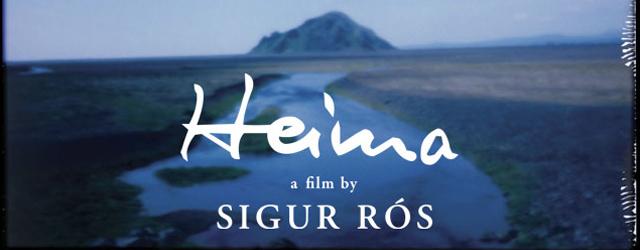Not only a great portrayal of a great band but also their country (population less than half a million) the enigmatic Iceland, Heima this documentary one of the best of its kind. It comes together in the hands of Canadian director Dean DeBlois. The film merges on several levels as music, film and art comes together to give us a profound experience which raises a new standard and blurs the lines for documentaries and videos. The film is a must see, specially for fans of the group and the for those ho enjoy the splendors of such an isolated and community-friendly Nordic landscape.
Filmed during the summer months, the band played a sprinkling of free, unannounced concerts in their homeland and the result is far from your-run-of-the-mill type of musical documentaries. With live performances in settings stemming from picturesque nooks and crannies to middle of nowhere locales and a homecoming in the capitol city of Reykjavik.
The band performed few songs before the screening, afterwards I had few moments to chat with director Dean DeBlois at the Arclight Theatres in
Hollywood.
Dean DeBlois
Yama Rahimi: How did the project came along?
Dean DeBlois: I was a bit of a stalker at first. I went to the Sigur Ros website and saw the link “Management” and contacted them because I was impressed and moved by the music and the videos they have done. I wanted to do videos like that.
YR: So you contacted their manager, John Best?
DD: Yes. I told them I work on feature films (Animation) and would like to meet and pitch ideas for music videos. To my surprise he wrote back and said send us your reel and we are on the tour and when we are in LA, I will introduce you to the band.
YR: I was amazed as well how accessible John and the group seemed very accessible too. You captured that well in the film that these guys are very nice guys. Usually when bands gets famous, they become out of reach. I'm sure you had the same experience.
DD: The guys are very grounded and there's nothing “Rock Star” about them. They live in a relatively small town where everybody knows each other. So I guess that keeps them leveled. I also thought that they would very serious guys with no sense of humor whatsoever which not the case at all. They are really funny and goof around most of the time but when it comes to their music, they take it seriously. When they are playing, they go into a mode where they don't talk. They come into the room and create a song out of nothing.
YR: As you mentioned earlier that they had some concert footage when you came on board and added additional material.
DD: The original crew shot a lot footage but, honestly, not much of it was good and the band discovered that quickly when they tried to cut a film. The footage was shot without any bigger idea in mind and the film wasn't about anything except for few performances put together. So what the film really needed was a point of view. I thought the most organic thing to do was to tell the story of what they tried to do which was to give a tour as tribute to the people that supported them all these years. It ended up bringing the whole country together because there were a lot of political issues that was dividing the country at the time.
YR: I was amazed at the idea of performing each song at a different location with its own distinct sound. How much was it your idea or the bands?
DD: Originally they wanted to do only one concert and it turned into a two week tour when they realized that they could make a film out of it. They very deliberately picked a variety of places from big open spaces to small intimate ones and placed them in equal distances so all parts of Iceland was represented in some way. As far each place having its own sound was more a editorial decision that the editor Nick Fenton and I decided which were the best performances at each location which was then presented to the band. Everybody mostly agreed as far as the selection from each song at a specific location.
YR: It was a profound experience for me how it all came together from music to film to art to pay not only a tribute to a band but also a country which a great accomplishment from a Canadian.
DD: I actually think it had to come from an outsider to put that together. To an Icelander everything in that film is kind of “So what? That's my backyard”. They have no real appreciation for how strange and different it is to the rest of the world.
YR: Have you screened the film in Iceland yet?
DD: Yes. It got a very positive response from the audience and the critics. They think it was beautiful and accurate portrait of their country but I think it had to come from an outsider to show how beautiful the country and its people are. There's something really romantic, amazing, raw and alien about these landscapes and this people that needed to be included in the film.
YR: I absolutely agree and you did a marvelous job. Thank you for the interview. If you ever want to shoot a film in Afghanistan let me
know.
DD: Thank you very much.
